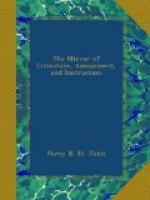There are two things that to a marvellous degree bring people under subjection—moral and corporeal fear. The most dissolute are held in restraint by the influence of moral worth, and there are few who would engage in a quarrel if they were certain that defeat or death would be the consequence. Cromwell obtained, and we may add, maintained his ascendancy over the people of England, by his earnest and continually directed efforts towards these two important ends. His court was a rare example of irreproachable conduct, from which all debauchery and immorality were banished; while such was his deep and intimate though mysterious acquaintance with every occurrence throughout the commonwealth, its subjects had the certainty of knowing that, sooner or later, whatever crimes they committed would of a surety reach the ear of the protector. His natural abilities must always have been of the highest order, though in the early part of his career he discovered none of those extraordinary talents that afterwards gained him so much applause, and worked so upon the affections of the hearers and standers-by. His mind may be compared to one of those valuable manuscripts that had long been rolled up and kept hidden from vulgar eyes, but which exhibits some new proof of wisdom at each unfolding. It has been well said by a philosopher, whose equal the world has not known since his day, “that a place sheweth the man.” Of a certainty Cromwell had no sooner possessed the opportunity so to do, than he showed to the whole world that he was destined to govern. “Some men achieve greatness, some men are born to greatness, and some have greatness thrust upon them.” With Cromwell greatness was achieved. He was the architect of his own fortunes, owing little to what is called “chance,” less to patronage, and still less to crime, if we except the one sad blot upon the page of his own history, as connected with that of his country. There appears in his character but a small portion of that which is evil, blended with much that is undoubtedly good. Although his public speeches were, for the most part, ambiguous—leaving others to pick out his meaning—or more frequently still, having no meaning to pick out, being words, words, words—strung of mouldy sentences, scriptural phrases, foolish exclamations, and such-like: yet when necessary, he showed that he could sufficiently command his style, delivering himself with so much energy, pith, propriety, and strength of expression, that it was commonly said of him under such circumstances, “every word he spoke was a thing.” But the strongest indication of his vast abilities was, the extraordinary tact with which he entered into, dissected, and scrutinized the nature of human kind. No man ever dived into the manners and minds of those around him with greater penetration, or more rapidly discovered their natural talents and tempers. If he chanced to hear of a person fit for his purpose, whether as a minister, a soldier, an artisan, a preacher,




